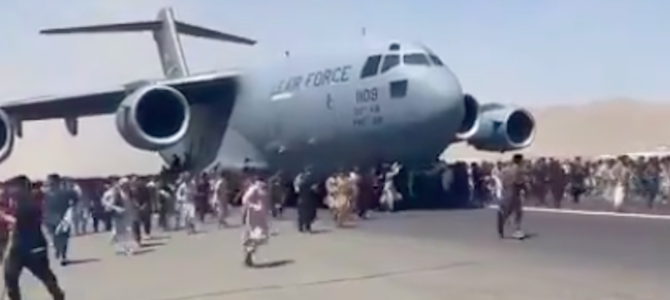
I left for a weekend mountain-climbing trip early this past Saturday, blissfully out of cell range and cut off from the outside world for nearly two full days.
That Friday evening before I left, there were reports that the security situation in Afghanistan was deteriorating, that the Taliban had taken control of three major cities in the western and southern parts of the country, and were quickly gaining ground elsewhere.
By the time I got back Sunday evening, Kabul had fallen. Breaking news email updates from The New York Times told the tale. Saturday night: “The Taliban now control every major city in Afghanistan except for the capital, Kabul.” Early Sunday morning: “The Taliban encircled Kabul, the last city under government control in Afghanistan.” Six hours later: “The Afghan president Ashraf Ghani is reported to have fled the country.”
An hour after that: “The Afghan government has collapsed.”
The speed of the collapse and the ensuing chaos were shocking. After 20 years in Afghanistan, most Americans didn’t expect it to end like this. Images of pandemonium at the airport in Kabul, of desperate crowds racing for a place on too-few planes, flooded social media.
Kabul Airport runway today. No words needed. pic.twitter.com/8SfzEOprUZ
— Shiv Aroor (@ShivAroor) August 16, 2021
There was the U.S. Air Force C-17 with 640 Afghans packed on board. There were the U.S. Humvees, MRAPs, and drones seized by the Taliban. There were the Taliban fighters, rifles in hand, riding bumper cars at a Kabul amusement park. There was the Chinook helicopter hovering over the U.S. embassy in Kabul, waiting to evacuate American diplomats and their families to the airport in an eerie echo of the fall of Saigon in 1975.
And then there were the falling men. First came the footage of people running alongside and clinging to a U.S. aircraft as it readied for takeoff, and then, as the plane rose over the runway, already impossibly high, the bodies falling away, tiny specks against a clear-blue sky.
In a desperate attempt to leave #Afghanistan, people are hanging on to the tires and the wing of the plane. Watch horrifying video of people falling from a flight takeoff at #Kabul Airport pic.twitter.com/2g1DW29jSU
— WION (@WIONews) August 16, 2021
Younger Americans, who were small children during the 9/11 attacks or born afterwards, never experienced the stomach-dropping horror of watching live news footage of people throwing themselves from the Twin Towers to escape the flames. The famous image of the “falling man” was seared into the minds of a generation of Americans who, before that fateful morning, never dreamed they would witness such a thing.
These young people, now in their twenties, have never known a time the United States was not at war in Afghanistan. Now they have their own iconic and stomach-dropping images of the war’s ignominious end: bodies falling from the sky as an American aircraft soars away.
As for the U.S. withdrawal, there’s no point slaying straw men, as President Biden did in his curt and disingenuous remarks on Monday. A defiant and defensive Biden (who took no questions afterwards) congratulated himself on ending U.S. operations in Afghanistan but refused to acknowledge the chaos that has engulfed the country and the obvious incompetence of his administration’s planning and execution of the withdrawal.
No one is debating the withdrawal itself. Some 70 percent of Americans support it. Former President Donald Trump captured the GOP nomination in 2016 partly because of his vocal opposition to the forever war in Afghanistan and the need to bring our troops home.
What we are debating now — and what the administration needs to explain — is how the withdrawal devolved into the disaster that’s still playing out. As many as 10,000 American citizens are still trapped in Kabul, unable to reach the airport as the Taliban go door to door searching for Westerners. Biden is sending 6,000 more troops into the country to help with the evacuation, but it’s unclear at this point if U.S. forces will even be able to maintain control of the airport.
As the Washington Post’s Josh Rogin noted, the State Department and Defense Department must either negotiate safe passage of American citizens with the Taliban or send troops into the city to find Americans and bring them back to the airport — a dangerous gambit that could easily turn into a Mogadishu-like catastrophe.
“American citizens’ houses have been ransacked, and they are in hiding because the Taliban are terrorizing and tormenting neighborhoods. That’s happening all over Kabul,” one senior GOP congressional staffer who has been fielding calls and emails from Americans in Kabul told Rogin. “There are a lot of people who are falling through the cracks. [The administration] didn’t have a plan to handle this on a mass scale… For the people in Kabul, they’ve basically said it’s up to them to get to the airport.”
Meanwhile, tens of thousands of Afghan civilians who worked with the U.S. military are desperately trying to get out of the country. The Biden administration has indicated there may be as many as 30,000 Afghan refugees who will need to be evacuated to the U.S. and housed in military bases.
In April, Biden stood before the American people and promised we would not “conduct a hasty rush to the exit” in Afghanistan, that we would end our mission there “responsibly, deliberately, and safely,” and do it “in full coordination with our allies and partners.” He panned the idea that the Taliban would overrun the country and that U.S. personnel would have to be airlifted from the rooftops.
All of that and more have happened in the past 72 hours. It is still happening. The long-overdue American exit from Afghanistan has turned into a calamity. Biden needs to answer for that.









